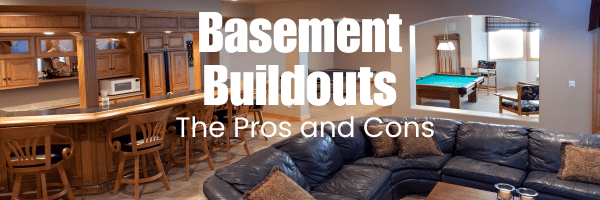
Should You Finish Your Basement? Here’s What Most People Don’t Think About Until It’s Too Late
Let’s be honest—basements have a bit of a reputation. They’re cold, a little dusty, and usually home to your least favorite things: that awkward furnace, the washer that sounds like it’s about to launch into orbit, and maybe a few boxes of old yearbooks you keep meaning to sort through.
But here’s the thing. That space under your feet? It might be the most underused part of your home.
More and more homeowners are turning their basements into livable square footage—and not just to increase property value. They’re doing it because space is hard to come by, especially if you don’t want to build an addition or uproot your life to move.
Still, it’s not all smooth sailing. Before you start sketching out your dream home theater or putting in that guest suite for the in-laws, there are a few things you should know—both the good and the not-so-good.
What’s Great About Basement Buildouts
More Room, Without the Move
For a lot of folks, the basement is just storage space. But with a little work, it can be a second living room, a gym, a playroom—whatever you need it to be. And unlike adding a new wing to the house, the structure is already there. You’re just giving it purpose.
They Add Serious Value
A finished basement can bump up your home’s value—and make it a whole lot more attractive when it’s time to sell. Buyers love the idea of a move-in-ready home with extra space that’s already done.
You Can Keep Costs Down
Compared to above-ground additions, finishing a basement is usually more affordable. You’re not pouring a new foundation or reworking the roof—you’re working within the walls you already have. That adds up to real savings.
The Flexibility Is Endless
One of the best parts of a basement remodel? You can tailor it to your lifestyle. Need a quiet office? Done. Want a bar, movie room, or a place for your teenager to crash with friends? You’ve got options.
Now for the Trade-Offs (Because There Are Always Trade-Offs)
Moisture Can Be a Problem
We’d love to tell you this part doesn’t matter—but it really does. Basements are notorious for being damp. If you don’t address moisture properly, it can lead to musty smells, mold, or worse. Waterproofing and drainage aren’t glamorous, but skipping them can wreck everything else you build.
It Might Feel Like a Cave—At First
Most basements weren’t built with natural light in mind. If you’re not careful, your brand-new space could feel dark and closed-in. You’ll want to be strategic with lighting—maybe even consider adding egress windows if you’re doing a bedroom.
There Will Be Weird Layout Challenges
Support beams. Low ceilings. Exposed ductwork. There’s usually something in a basement that can’t be moved—and you’ll need to work around it. Good design helps, but flexibility is key.
Permits and Inspections Are Non-Negotiable
Here’s where reality sets in. You can’t just knock out a wall and call it a day. You’ll need permits, inspections, and probably an okay from the county. It’s a bit of a process, but skipping this step can cause serious headaches down the road.
A Final Thought Before You Start Framing
If you’ve made it this far, you’re probably still interested—and that’s great. A finished basement really can change the way you live in your home. But do it the right way, with the right help.
If you’re thinking about adding a bathroom downstairs or reworking the plumbing to suit your layout, let’s talk. At My Georgia Plumber, we’ve helped homeowners across North Georgia transform their basements—and we know exactly what to look for, what to avoid, and how to get it done without surprises.
Give us a call at 770-268-2331 and we’ll help you map it all out—moisture control, plumbing layout, code compliance, and everything in between. It’s your space. Let’s make it work the way it should.











